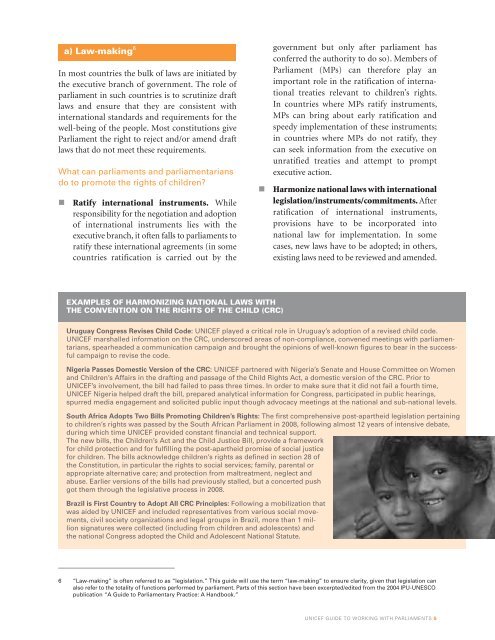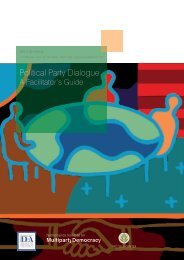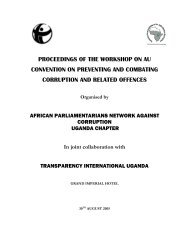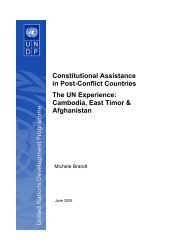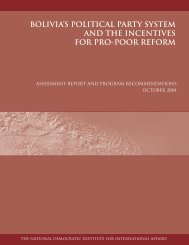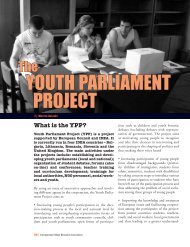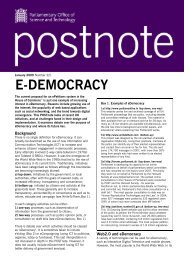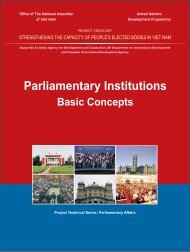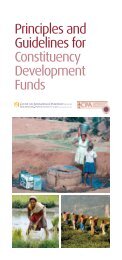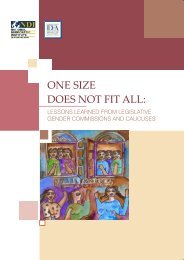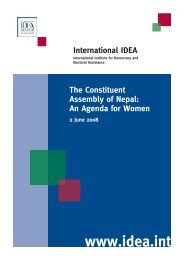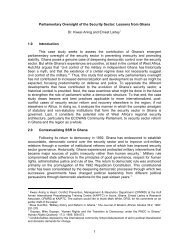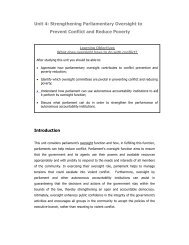guide to working with parliaments - Unicef
guide to working with parliaments - Unicef
guide to working with parliaments - Unicef
Create successful ePaper yourself
Turn your PDF publications into a flip-book with our unique Google optimized e-Paper software.
a) Law-making 6<br />
In most countries the bulk of laws are initiated by<br />
the executive branch of government. The role of<br />
parliament in such countries is <strong>to</strong> scrutinize draft<br />
laws and ensure that they are consistent <strong>with</strong><br />
international standards and requirements for the<br />
well-being of the people. Most constitutions give<br />
Parliament the right <strong>to</strong> reject and/or amend draft<br />
laws that do not meet these requirements.<br />
What can <strong>parliaments</strong> and parliamentarians<br />
do <strong>to</strong> promote the rights of children?<br />
Ratify international instruments. While<br />
responsibility for the negotiation and adoption<br />
of international instruments lies <strong>with</strong> the<br />
executive branch, it often falls <strong>to</strong> <strong>parliaments</strong> <strong>to</strong><br />
ratify these international agreements (in some<br />
countries ratification is carried out by the<br />
<br />
government but only after parliament has<br />
conferred the authority <strong>to</strong> do so). Members of<br />
Parliament (MPs) can therefore play an<br />
important role in the ratification of international<br />
treaties relevant <strong>to</strong> children’s rights.<br />
In countries where MPs ratify instruments,<br />
MPs can bring about early ratification and<br />
speedy implementation of these instruments;<br />
in countries where MPs do not ratify, they<br />
can seek information from the executive on<br />
unratified treaties and attempt <strong>to</strong> prompt<br />
executive action.<br />
Harmonize national laws <strong>with</strong> international<br />
legislation/instruments/commitments. After<br />
ratification of international instruments,<br />
provisions have <strong>to</strong> be incorporated in<strong>to</strong><br />
national law for implementation. In some<br />
cases, new laws have <strong>to</strong> be adopted; in others,<br />
existing laws need <strong>to</strong> be reviewed and amended.<br />
EXAMPLES OF HARMONIZING NATIONAL LAWS WITH<br />
THE CONVENTION ON THE RIGHTS OF THE CHILD (CRC)<br />
Uruguay Congress Revises Child Code: UNICEF played a critical role in Uruguay’s adoption of a revised child code.<br />
UNICEF marshalled information on the CRC, underscored areas of non-compliance, convened meetings <strong>with</strong> parliamentarians,<br />
spearheaded a communication campaign and brought the opinions of well-known figures <strong>to</strong> bear in the successful<br />
campaign <strong>to</strong> revise the code.<br />
Nigeria Passes Domestic Version of the CRC: UNICEF partnered <strong>with</strong> Nigeria’s Senate and House Committee on Women<br />
and Children’s Affairs in the drafting and passage of the Child Rights Act, a domestic version of the CRC. Prior <strong>to</strong><br />
UNICEF’s involvement, the bill had failed <strong>to</strong> pass three times. In order <strong>to</strong> make sure that it did not fail a fourth time,<br />
UNICEF Nigeria helped draft the bill, prepared analytical information for Congress, participated in public hearings,<br />
spurred media engagement and solicited public input though advocacy meetings at the national and sub-national levels.<br />
South Africa Adopts Two Bills Promoting Children’s Rights: The first comprehensive post-apartheid legislation pertaining<br />
<strong>to</strong> children’s rights was passed by the South African Parliament in 2008, following almost 12 years of intensive debate,<br />
during which time UNICEF provided constant financial and technical support.<br />
The new bills, the Children’s Act and the Child Justice Bill, provide a framework<br />
for child protection and for fulfilling the post-apartheid promise of social justice<br />
for children. The bills acknowledge children’s rights as defined in section 28 of<br />
the Constitution, in particular the rights <strong>to</strong> social services; family, parental or<br />
appropriate alternative care; and protection from maltreatment, neglect and<br />
abuse. Earlier versions of the bills had previously stalled, but a concerted push<br />
got them through the legislative process in 2008.<br />
Brazil is First Country <strong>to</strong> Adopt All CRC Principles: Following a mobilization that<br />
was aided by UNICEF and included representatives from various social movements,<br />
civil society organizations and legal groups in Brazil, more than 1 million<br />
signatures were collected (including from children and adolescents) and<br />
the national Congress adopted the Child and Adolescent National Statute.<br />
6 “Law-making” is often referred <strong>to</strong> as “legislation.” This <strong>guide</strong> will use the term “law-making” <strong>to</strong> ensure clarity, given that legislation can<br />
also refer <strong>to</strong> the <strong>to</strong>tality of functions performed by parliament. Parts of this section have been excerpted/edited from the 2004 IPU-UNESCO<br />
publication “A Guide <strong>to</strong> Parliamentary Practice: A Handbook.”<br />
UNICEF GUIDE TO WORKING WITH PARLIAMENTS 5


